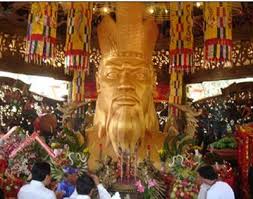
WORSHIP OF HUNG KINGS IN PHU THO PROVINCE
According to legend, Lac Long Quan – son of Kinh Duong Vuong Loc Tuc got married with Au Co – daughter of King De Lai and gave birth to 100 sons. After that, 50 sons followed Au Co and 50 others followed Lac Long Quan to settle. The first son followed his mother to arrived in Phong Chau Land (now Phu Tho Province) and established Van Lang Nation and became King Hung
The worship of Hung Kings originates from Hung Kings dynasty in the belief that all Vietnamese people have the same origin “Dragon’s children and Fairy’s grand-children”; and also expresses Vietnamese philosophy “When drinking water, remember the source” and the spirit of great national unity.
According to legend, Lac Long Quan – son of Kinh Duong Vuong Loc Tuc got married with Au Co – daughter of King De Lai and 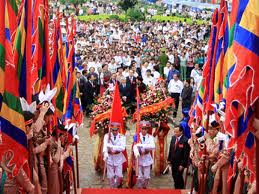 gave birth to 100 sons. After that, 50 sons followed Au Co and 50 others followed Lac Long Quan to settle. The first son followed his mother to arrived in Phong Chau Land (now Phu Tho Province) and established Van Lang Nation and became King Hung. Van Lang was the first nation in Vietnamese history and ruled by 18 kings. Hung Kings taught local people to grow rice and selected Nghia Linh Mountain, the highest mountain in the region to perform the religious rituals of the agricultural population as worship of rice god and sun god for the good weather, good crops. To remember the great merit of Hung Kings, the people set up the temple (Hung Kings Temple Relic Site) at the center of Nghia Linh Mountain and chose the 10th day of the third lunar month as Ancestral Anniversary day. From this first temple, the worship of Hung Kings has gradually spread and reaches a national level, and now it is practiced at temples in Northern, Central and Southern and also by Vietnamese overseas.
gave birth to 100 sons. After that, 50 sons followed Au Co and 50 others followed Lac Long Quan to settle. The first son followed his mother to arrived in Phong Chau Land (now Phu Tho Province) and established Van Lang Nation and became King Hung. Van Lang was the first nation in Vietnamese history and ruled by 18 kings. Hung Kings taught local people to grow rice and selected Nghia Linh Mountain, the highest mountain in the region to perform the religious rituals of the agricultural population as worship of rice god and sun god for the good weather, good crops. To remember the great merit of Hung Kings, the people set up the temple (Hung Kings Temple Relic Site) at the center of Nghia Linh Mountain and chose the 10th day of the third lunar month as Ancestral Anniversary day. From this first temple, the worship of Hung Kings has gradually spread and reaches a national level, and now it is practiced at temples in Northern, Central and Southern and also by Vietnamese overseas.
According to historical documents, the worship of Hung Kings has strongly developed for a long time before officially honored in Le 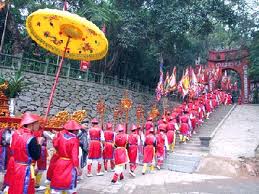 Dynasty (1428 – 1788). It was acknowledged by the imperial dynasties of the Le (1428–1788), Tay Son (1778–1802), and Nguyen (1802–1945) by means of codified legends, royal conferment, and provision of lands to support the worship. Today the Government allocates a substantial budget to safeguard, restore and maintain the spaces of the worship of Hung Kings, especially at Hung Kings Temple Relic Site, and supports the efforts of local people with a role in the Hung Kings Ancestral Anniversary, publishing items (books and DVDs) on legends, rituals and the folk arts related to the worship to serve communities. There are also initiatives to include Hung Kings legend materials in the school curriculum in order transmit the tradition to future generations. The Government also approved a public holiday on the 10th day of the third lunar month so that people nationwide participate and organize sacrificial activities. The total number of Hung Kings temples nationwide is 1,417.
Dynasty (1428 – 1788). It was acknowledged by the imperial dynasties of the Le (1428–1788), Tay Son (1778–1802), and Nguyen (1802–1945) by means of codified legends, royal conferment, and provision of lands to support the worship. Today the Government allocates a substantial budget to safeguard, restore and maintain the spaces of the worship of Hung Kings, especially at Hung Kings Temple Relic Site, and supports the efforts of local people with a role in the Hung Kings Ancestral Anniversary, publishing items (books and DVDs) on legends, rituals and the folk arts related to the worship to serve communities. There are also initiatives to include Hung Kings legend materials in the school curriculum in order transmit the tradition to future generations. The Government also approved a public holiday on the 10th day of the third lunar month so that people nationwide participate and organize sacrificial activities. The total number of Hung Kings temples nationwide is 1,417.
The worship of Hung Kings has diversified forms, typically Hung Kings are jointly worshiped with many other characters as princesses Tien Dung, Ngoc Hoa; Saint Tan Vien; Trung Trac and Trung Nhi… in the temples in Phu Tho Province. The joint 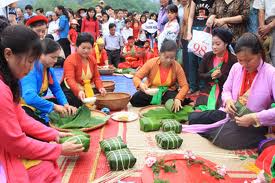 worship forms with Long Hai Dai Vuong, Phu Dong Thien Vuong, Mai An Tiem, Chu Dong Tu… also develop in Ha Noi, Thai Binh, Hai Duong, Thanh Hoa… In many localities, Hung Kings are also joint-worshiped at family’s altar.
worship forms with Long Hai Dai Vuong, Phu Dong Thien Vuong, Mai An Tiem, Chu Dong Tu… also develop in Ha Noi, Thai Binh, Hai Duong, Thanh Hoa… In many localities, Hung Kings are also joint-worshiped at family’s altar.
Every year, on the 10th day of the third lunar month, Ancestral Anniversary day is held at Hung Kings temples nationwide, of which biggest one takes place in Hung Kings Temple Relic Site. In Phu Tho Province, each village selects a Festival Organizing Board (Ban Khanh Tiet) of 6-9 mature, knowledgeable individuals of good conducts who lead and manage the rituals. The Board appoints suitably expert temple guardians to tend worship sites, instruct devotees and offer incense to Hung Kings year round. In addition, villages also select strictly Ritual Committee and knowledgeable elders.
On major Hung Kings festival days, communities make offerings of rice-based delicacies such as square cakes (banh chung) and glutinous cakes (banh giay). People engage in verbal and folk arts and performances including reading of supplication petitions, praying, bronze drum beating and Xoan singing.
With unique and distinct values, on 6 December 2012, in Paris (France), UNESCO officially recognized the worship of Hung Kings 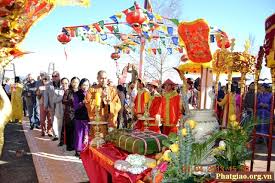 in Phu Tho Province as Intangible Cultural Heritage of Humanity. This is the first belief in Viet Nam recognized as world heritage. The recognized-space includes 109 villages in Phu Tho Town, Viet Tri City and districts of Cam Khe, Doan Hung, Ha Hoa, Lam Thao, Phu Ninh, Tam Nong, Thanh Ba, Thanh Son, Thanh Thuy and Yen Lap (Phu Tho Province).
in Phu Tho Province as Intangible Cultural Heritage of Humanity. This is the first belief in Viet Nam recognized as world heritage. The recognized-space includes 109 villages in Phu Tho Town, Viet Tri City and districts of Cam Khe, Doan Hung, Ha Hoa, Lam Thao, Phu Ninh, Tam Nong, Thanh Ba, Thanh Son, Thanh Thuy and Yen Lap (Phu Tho Province).
ATTRACTIONS
- National Father Lac Long Quan Temple
- National Mother Au Co Temple
- Hung Kings Temple
- Hung Vuong Museum


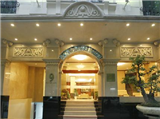 Royal Gate
Royal Gate
 NIKKO HANOI
NIKKO HANOI
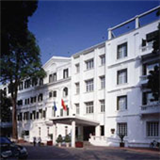 Trade Union Hotel Hanoi (Congdoan hotel)
Trade Union Hotel Hanoi (Congdoan hotel)
.jpg) Cultural Hanoi
Cultural Hanoi
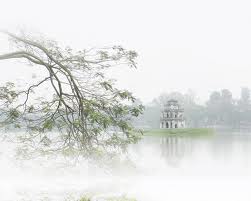 North Vietnam Exclusive
North Vietnam Exclusive
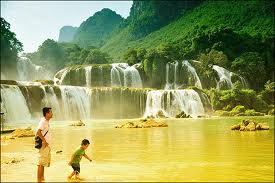 Attractive North
Attractive North
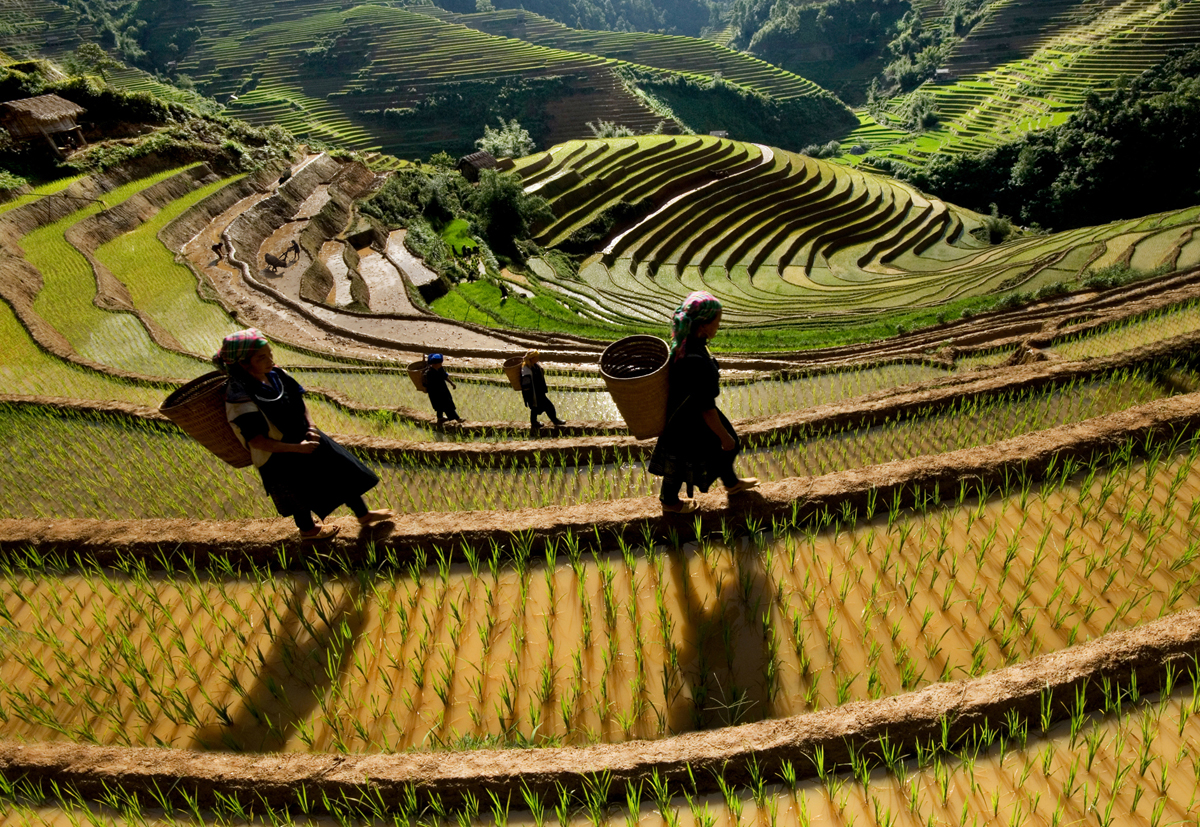 Charming North
Charming North

